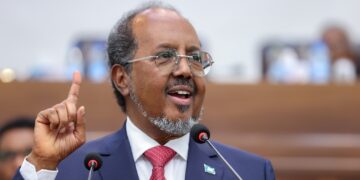Somalia’s National Consultative Conference (NCC) has shed its advisory skin and reemerged as the Justice and Solidarity Party (JSP), a fully fledged political organization that names President Hassan Sheikh Mohamud as its chairman and presidential candidate. Last night’s launch ceremony transformed the inter-state forum—once hailed as a landmark in federal reconciliation—into what critics now deride as a partisan vehicle designed to entrench the president and his allies.
The formation of the JSP marks a dramatic reversal of the NCC’s original purpose. Instead of forging broad consensus on electoral and constitutional reforms, the forum’s leaders have aligned themselves behind a single figure, effectively coalescing federal member state (FMS) heads, key ministers, and ruling-party loyalists into a hierarchical political apparatus. In speeches that extended into the early hours, President Hassan Sheikh asserted that Somalia would bypass indirect elections henceforth and move directly to universal suffrage—a pledge observers view as a thinly veiled attempt at rigging elections. The NCC-turned-JSP has abandoned any pretense of neutrality, raising urgent questions about legitimacy, electoral fairness, and the future of Somalia’s fragile federation.
From National Platform to Partisan Entity
Just weeks ago, the NCC convened under the banner of forging a “unified roadmap” toward elections and deeper federal cooperation. Delegates from six of Somalia’s eight member states—including Hirshabelle, Galmudug, Southwest, and the newly recognized SSC-Khatumo—participated in closed-door deliberations. Barely had the final communiqué been issued when steps were taken towards its evolution into a political party.
In a ceremony suffused with pomp, President Hassan Sheikh ascended to a podium flanked by FMS presidents. He declared that the newly minted JSP would champion “direct democracy” and “national solidarity,” positioning itself as the vehicle for implementing the very reforms the NCC had agreed upon. Yet by assuming the dual role of conference chair and party leader, the president left scant room for dissenting voices within the NCC structure.
Political analysts contend that this maneuver amounts to a classic fusion of state and party. Grafting the president’s electoral ambitions onto an ostensibly neutral consultative body, the JSP erodes the distinction between governance and campaigning. What once served as a forum for negotiating power-sharing has become an instrument for consolidating power. In doing so, the NCC forfeits any claim to represent the people impartially. Instead, it dons the mantle of a partisan outfit, its membership bound by loyalty to a single leader rather than by the broader constitutional principles it once espoused.
Direct Elections
Perhaps the most striking pledge of last night’s launch was the commitment to hold direct elections—a significant departure from Somalia’s clan-delegate system, which had undergirded the 2022 parliamentary polls. President Hassan Sheikh vowed that his party would design an electoral framework enabling universal participation by mid-2026.
Yet beneath the rhetoric of liberation, a more calculating logic emerges. Direct elections in Somalia face daunting obstacles: security risks, logistical complexities, and the necessity of credible voter registration across contested territories. The president’s control over state machinery—media outlets, security services, and the electoral commission—gives the JSP a decisive advantage in shaping electoral laws, delineating constituencies, and vetting candidates. Opponents warn that the promise of direct suffrage could mask preordained results, engineered through gerrymandered districts, uneven media access, and selective enforcement of electoral regulations.
This pattern recalls earlier episodes in Somali politics, where incumbents championed reforms that ostensibly expanded democracy but ultimately cemented their hold on power. By linking the direct-election pledge to the NCC’s brand of national unity, the president casts any critique as an attack on the federal project itself. Those who decry the JSP’s partisan turn risk being branded spoilers of democracy rather than defenders of process. In effect, last night’s launch suspended the very safeguards—transparent debate, multi-stakeholder oversight, and independent adjudication—that underpin free and fair elections.
The Security Imperative Overshadowed
As some of Somalia’s leaders stake their claims on ballots and party charters, the country’s security situation deteriorates. In the preceding weeks, Al-Shabab exploited the federal schism to intensify attacks on supply lines leading into Mogadishu, ambushing convoys on the Balcad road and staging hit-and-run assaults near key river crossings. The group’s fighters have reestablished control over stretches of Lower and Middle Shabelle, recapturing towns once declared liberated. In response, the African Union and federal authorities reversed their planned ATMIS drawdown, injecting an additional 8,000 troops to bolster AUSSOM forces—effectively admitting that Somali security forces remain unable to hold territory without robust international support.
Yet last night’s JSP launch devoted scant attention to these pressing security challenges. Instead, the spectacle emphasized party slogans, candidate profiles, and the mechanics of direct elections. Observers contend that this misallocation of political capital mirrors the president’s broader pattern: fixating on constitutional and electoral maneuvers while marginalizing the very military and intelligence reforms necessary to counter Al-Shabab’s advance. As a result, the JSP’s rise risks taxing Somalia’s already frayed security apparatus, compelling regional administrations to fill the void through ad-hoc militias and autonomous security pacts—arrangements that further complicate coordinated counter-terrorism efforts.







